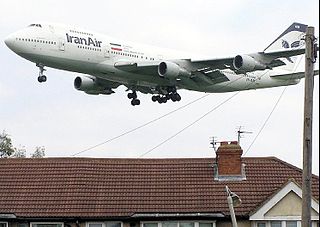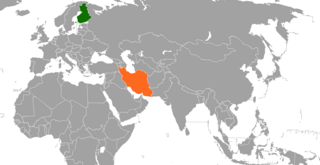
Iran and the United States have had no formal diplomatic relations since 7 April 1980. Instead, Pakistan serves as Iran's protecting power in the United States, while Switzerland serves as the United States' protecting power in Iran. Contacts are carried out through the Iranian Interests Section of the Pakistani Embassy in Washington, D.C., and the US Interests Section of the Swiss Embassy in Tehran. In August 2018, Supreme Leader of Iran Ali Khamenei banned direct talks with the United States.

Germany–Iran relations are the bilateral relations between Germany and Iran. Official diplomatic relations between Iran and Germany after World War II began in 1939, when Iran opened its first diplomatic mission office in Bonn, both countries′ predecessor states had maintained formal diplomatic relations since the end of 19th century. Germany has an embassy in Tehran, which was originally established in the court of Naser al-Din Shah Qajar in October 1884 and has been in the present building since 1894. Iran opened its embassy in Berlin in 1885. Germany and Iran continued to have political relations well into World War II. In December 2022, Germany said it was "suspending state incentives to promote trade with Iran due to the repression of demonstrators."

Iran–United Kingdom relations are the bilateral relations between the United Kingdom and Iran. Iran, which was called Persia by the West before 1935, has had political relations with England since the late Ilkhanate period when King Edward I of England sent Geoffrey of Langley to the Ilkhanid court to seek an alliance.

Iran–Italy relations are the diplomatic relations between the Islamic Republic of Iran and the Italian Republic.

Iran–Turkey relations are the bilateral relations between the Islamic Republic of Iran and the Republic of Turkey. The two states' relationship is complex and characterized by periods of both tension and cooperation, as both Iran and Turkey are fighting for influence in the Middle East through supporting opposing proxies as part of a proxy conflict. The two countries are also major trade partners and are perceived as mutually interdependent due to geographical proximity as well as historically shared cultural, linguistic, and ethnic traits.

Following the Iranian Revolution, the United States has since 1979 applied various economic, trade, scientific and military sanctions against Iran. United States economic sanctions are administered by the Office of Foreign Assets Control (OFAC), an agency of the United States Department of the Treasury. As of 2017, United States sanctions against Iran include an embargo on dealings with the country by the United States, and a ban on selling aircraft and repair parts to Iranian aviation companies.

Iran–North Korea relations are described as being positive by official news agencies of the two countries. Diplomatic relations improved following the Iranian Revolution in 1979 and the establishment of an Islamic Republic. Iran and North Korea pledge cooperation in educational, scientific, and cultural spheres. Some media reports claim this cooperation extends to nuclear cooperation, though official U.S. government publications and academic studies have disputed this. The United States has been greatly concerned by North Korea's arms deals with Iran, which started during the 1980s with North Korea acting as a third party in arms deals between the Communist bloc and Iran, as well as selling domestically produced weapons to Iran, and North Korea continues selling missiles to Iran. North Korea and Iran are the remaining two members of George W. Bush's "Axis of evil", which has led to many of the concerns regarding Iran–North Korea relations.

Diplomatic relations between Australia and Ukraine were established in 1992. Ukraine has had an embassy in Canberra since March 2003 and the Australian Embassy in Kyiv was established in December 2014, however, Australia closed its embassy in Kyiv in February 2022 due to the 2022 Russian invasion of Ukraine.

Iran–Switzerland relations are foreign relations between the Islamic Republic of Iran and the Swiss Confederation.

Canada and Iran have had no formal diplomatic relations since 2012. In the absence of diplomatic representation, Italy acts as the protecting power for Canada in Iran and Switzerland acts as Iran's protecting power in Canada.

The P5+1 refers to the UN Security Council's five permanent members ; namely China, France, Russia, the United Kingdom, and the United States; plus Germany. The P5+1 is often referred to as the E3+3 by European countries. It is a group of six world powers which, in 2006, joined together in diplomatic efforts with Iran with regard to its nuclear program.
There have been a number of international sanctions against Iran imposed by a number of countries, especially the United States, and international entities. Iran was the most sanctioned country in the world until it was surpassed by Russia, following Russia's invasion of neighboring Ukraine in February 2022.

European Union–Iran relations are the bilateral relations between Iran and the European Union (EU). The EU is Iran's largest trading partner, along with China and the United Arab Emirates. Trade with Iran is subject to the general EU import regime and the EU supports the goal of Iranian accession to the World Trade Organization (WTO). The EU has accused and criticized Iran for human rights violations, which led to diplomatic tensions, but both sides aim at improving and normalizing relations. Should Turkey's accession to the EU take place, Iran will border the European Union.

Brazil–Iran relations are the bilateral relations between the Federative Republic of Brazil and the Islamic Republic of Iran. Relations are characterized by economic and diplomatic cooperation and are quite friendly. Iran has a productive trade balance with Brazil. The two governments signed a document to bolster cooperation during the G-15 Summit in Tehran in 2010. However, since the election of former Brazilian president, Dilma Rousseff, relations between the two countries recently have deteriorated greatly, following Rousseff shifting Brazil away from Iran due to Iran's violation of human and civil rights. Mahmoud Ahmadinejad's media adviser, Ali Akbar Javanfekr, was quoted as stating that Rousseff had "destroyed years of good relations" between them. He denied making such a statement.

Iran and South Korea have had diplomatic relations since 1962. Throughout history, the two countries have maintained a normal relationship despite South Korea's close relationship with the United States, and Iran's close relationship with North Korea. However, many South Koreans disapprove of Iran's nuclear program and its open alliance with North Korea, sometimes leading the South Korean government to sanction Iran.

Australia–North Korea relations refers to the existing bilateral relationship between Australia and North Korea. Relations were officially established on 31 July 1974 when Australia extended diplomatic recognition to North Korea under the Whitlam government. Overall, relations have been stressed and at times, tense, due to Australia's historical involvement in the Korean War and military alliance with the United States, and contemporary disputes such as North Korea's nuclear weapons program and accusations of human rights abuses by both sides.

Iran–Sweden relations are foreign relations between the Islamic Republic of Iran and the Kingdom of Sweden.

Finland and Iran maintain diplomatic relations.

Iran–Philippines relations refer to foreign relations between Iran and the Philippines. Diplomatic relations were established on January 22, 1964. There is a community of thousands of Iranians in the Philippines including many international students drawn by the country's low-cost English education.

The Joint Comprehensive Plan of Action, commonly known as the Iran nuclear deal or Iran deal, is an agreement on the Iranian nuclear program reached in Vienna on 14 July 2015 between Iran, the P5+1, and the European Union.























